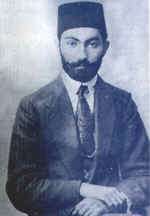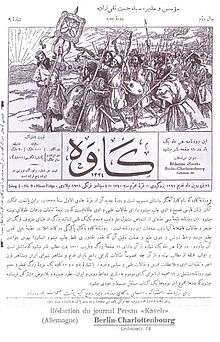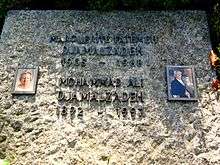Mohammad-Ali Jamalzadeh
| Mohammad-Ali Jamālzādeh Esfahani محمد علی جمالزاده اصفهانی | |
|---|---|
 Mohammad Ali Jamalzadeh in 1915 | |
| Born |
Mohammad-Ali Jamālzādeh Esfahani 13 January 1892 Esfahan, Iran (then Persia) |
| Died |
8 November 1997 (aged 105) Geneva, Switzerland |
| Nationality | Iranian |
| Known for | Short Story |
| Notable work | Yeki Bud Yeki Nabud (Once Upon a Time) |
Mohammad-Ali Jamālzādeh Esfahani (Persian: محمد علی جمالزاده اصفهانی) (January 13, 1892, Isfahan, Iran – November 8, 1997, Geneva, Switzerland), was one of the most prominent writers of Iran in the 20th century, best known for his unique style of humour. In view of his vast influence over Persian short-story writing, he is often referred to as the father of this genre in Iran.
Biography
Early years and family
Sayyed Mohammad-Ali Jamalzadeh[1] was born in Esfahan into a middle-class family. The date of his birth is uncertain; years between 1892 and 1896 have been mentioned and, by the end of his life, even he himself was not certain of the actual year. The year 1895 has traditionally been taken as the year of his birth.
Jamalzadeh's father, Sayyed Jamal ad-Din Esfahani, was a progressive mullah and preacher who became a constitutional revolutionary, delivering raging sermons which inspired his son but cost him his life; he was executed in 1908 on the order of Mohammad-Ali Shah Qajar who considered him among the most dangerous of his enemies.
Living abroad

The young Jamalzadeh lived in Iran only until he was twelve or thirteen. Thereafter, he lived in Lebanon, where he attended the Aintoura Catholic School (1908) near Beirut, in France (1910), and in Switzerland where he studied law at University of Lausanne and later at University of Burgundy in Dijon, France.
After his father's death, Jamalzadeh's life took a turn for the worse, but thanks to many supporting friends and to occasional paid teaching jobs, he survived starvation. By the time of World War I, still in his early age, he joined a group of Iranian nationalists in Berlin and, in 1915, founded a newspaper (Rastakhiz) for this group in Baghdad.[2] After remaining in Baghdad, Jamalzadeh went to Constantinople where he witnessed the Armenian Genocide and encountered many corpses during his journey.[3] He wrote of his experiences and eye-witness accounts decades later in two books entitled "Qatl-e Amm-e Armanian" (Armenian massacres) and "Qatl o ḡārat-e Arāmaneh dar Torkiya" (On the massacres of Armenians in Ottoman Turkey) which were published in 1972 and 1963 respectively.[3] During this time he also worked for the periodical Kāveh (1916).[4] In 1917, he published his first book Ganj-e Shaye-gan (The Worthy Treasure). An overview of Iran of the start of the 20th century, Ganj-e Shaye-gan deals with Iran's socio-political and economic problems, a major contribution which bridges the gap between literature and science. In the same year he represented the Nationalists at the World Congress of Socialists in Stockholm. His later years, until 1931 when he settled in Geneva and worked thereafter for the International Labour Organization, were spent in temporary employments, such as one at the Iranian embassy in Berlin.
During all these years, Jamalzadeh had very little contact with Iran. But that did not bar him from learning Persian on his own. Drawing on his scant experiences gained at a young age, he wrote about the lives of contemporary Iranians. His preoccupation with the use of language and his Dickensian style of writing, including repetitions, piling up of adjectives, and using popular phrases, quickly remind the reader of Jamalzadeh's background and of his sincere intentions. However, his physical distance from the scenes of the events described in his stories somewhat compromises the accuracy of his works.
Literary works
Jamalzadeh's major work Yeki Bud Yeki Nabud [5] (یکی بود یکی نبود - Once Upon a Time), published in 1921 in Berlin, did not reach Iran until a year later, and when it did, it was not received favourably. The public, especially the clergy, loathed Jamalzadeh's portrayal of their country to the degree that copies of the book were burned in public squares. A collection of six short stories, Yeki Bud Yeki Nabud deals with the social and political conditions in Iran around the start of the 20th century, a subject that up to then had been outside the purview of writers and poets in general. Moreover, interwoven with this is a considerable amount of militancy against Western interference in Iran and an open mockery of religious fanaticism. Jamalzadeh's simple and colloquial style, combined with a measured humour, enhanced the impact of his writings, making his stories such as Yeki Bud Yeki Nabud and Farsi Shekar Ast (Persian is Sugar) even more poignant than otherwise would be the case.
This hostile public reaction affected Jamalzadeh to the degree that for the next twenty years he refrained from engaging in any literary activities. He began writing again in the 1940s, but by that time he had lost the dexterity that imparted conciseness, novelty of form, originality of ideas, a biting sense of humor, and a tight structure to his earlier stories. Tautologism, a tendency toward using sage remarks, making mystical and philosophical speculations, and disregard for order became the hallmark of his later writings. Sahra-ye Mahshar (Armageddon) (1947), Talkh-o Shirin (Bitter and Sweet) (1955), Kohne va Now (Old and New) (1959), Qair az Khoda Hichkas Nabud (None Existed Except God) (1961), Asman-o Risman (The Blue Yonder and Rope) (1965), Qesse-ha-ye Kutah Bara-ye Bachcheha-ye Rish-dar (Short Stories for Bearded Children [i.e. for Adults]) (1974), and Qesse-ye Ma be Akhar Rasid [6] (Thus Ends Our Story) (1979) were written during this phase of his literary activity. Although Jamalzadeh continued to criticize the court and the clergy, some of his works of this period lack his original unique Persian style, even though he is at times as biting and as veracious as in his earlier writings.[7]
In addition to Persian, Jamalzadeh was fluent in French, German, and Arabic. He translated many books from the latter languages into Persian.
Death

Jamalzadeh died at the age of 105, in Geneva, Switzerland. His tomb is located in the “Petit-Saconnex” cemetery (block number 22).
Personal life
In 1914 Jamalzadeh married his first wife Josephine, a Swiss woman and a fellow student in Dijon.[8] In 1931 and during his residence in Geneva, Jamalzadeh married his second wife, the German Margaret Eggert.
Bibliography
Writings
- Shaygan's Treasure (1916)
- Iran and Russia Relations (1921)
- Yeki Bud Yeki Nabud (Once Upon a Time) (1921)
- Prosperity Garden (1938)
- Sadi's Councils (1938)
- Lunatic Asylum (1941)
- Story of Stories (1941)
- Amo Hosseinali's Biography (1942)
- Qoltashan Collection (1946)
- Gathering Desert (1947)
- Rah-Ab Nameh (1947)
- A Man with Thousand Professions (1947)
- Masoumeh Shirazi [play] (1954)
- Bitter and Sweet (1955)
- Sar va Tah Yeh Karbas (1956)
- Masterpiece (1958)
- Pipe's Voice (1958)
- Old and New (1959)
- Jamali's Kashkoul (1960)
- None Existed Except God (1961)
- Seven Countries (1961)
- Soil and Human (1961)
- Vulgar Encyclopedia (1962)
- Earth, Landlord and Peasant (1962)
- Mysteries' Small Box (1963)
- Cock-and-Bull (1964)
- Method of Writing and Story Writing (1966)
- Shiraz and Humor of Us, Iranian (1966)
- Short Stories for Bearded Children (1973)
- Isfahan (1973)
- Nightingale (1973)
- Qanbar Ali, A Generous of Shiraz (1973)
- Our Story is Finished (1978)
- Familiar Democracy (1984)
- Acquaintance with Hafiz Thesis (1988)
Translation
- Le Café du Surat by Bernardin de Saint-Pierre (1921)
- The Story of Mankind by Hendrik Willem van Loon (1955)
- Wilhelm Tell by Friedrich Schiller (1956)
- Don Carlos by Friedrich Schiller (1956)
- Selected Stories by Molière (1957)
- L'Avare by Molière (1957)
- Democracy and Human Prestige (1959)
- En Folkerfiende by Henrik Ibsen (1961)
- Turkmen War by Conte de Gobineau ] (1973)
Further reading
- Mohammad Ali Jazayery, Review: Modern Persian Prose Literature, Journal of the American Oriental Society, Vol. 90, No. 2, pp. 257 – 265 (1970).
- Mohammad-Ali Jamalzadeh, Once Upon a Time. Encyclopædia Britannica online.
- A Day in Rostamabad of Shemiran. Lib.Washington.edu.
Notes and references
- ↑ Jamalzadeh is also transliterated Jamalzada, Jamal-zadeh, or Jamalzadah. Further, Sayyed (a descendant of the Islamic prophet Muhammad) is a variant spelling of Sayyid.
- ↑ See Ebrahim Poordavood.
- 1 2 "JAMALZADEH, MOHAMMAD-ALI i". Encyclopædia Iranica.
- ↑ See Sayyed Hasan Taqizadeh.
- ↑ The literal translation of the phrase Yeki Bud Yeki Nabud is One Was There And One Was Not There, or There Was One And There Wasn't One, alluding to an indefinite time and place. Opening a story by Yeki Bud Yeki Nabud prepares the hearers (especially those of very young age) or readers that what they are about to hear or read is not necessarily true. Many may agree with the writer of this footnote, that hearing the words Yeki Bud Yeki Nabud immediately creates a very warm and intimate feeling in children; this feeling is often invoked even in those of advanced age upon hearing this phrase.
- ↑ Qesse-ye Ma be Akhar Rasid, or Qesse-ye Ma be Sar Rasid, is also a traditional phrase which often ends Persian stories for children; these stories are often enclosed by Yeki Bud Yeki Nabud and Qesse-ye Ma be Akhar Rasid.
- ↑ Sadegh Hedayat's works, especially his Tupp-e Morvarid (Pearl Cannon), are devoted to a parody of the twin pillars of the Iranian government of his time, court and clergy.
- ↑ http://www.iranicaonline.org/articles/jamalzadeh-i
See also
External links
| Wikimedia Commons has media related to Mohammadali Jamalzadeh. |